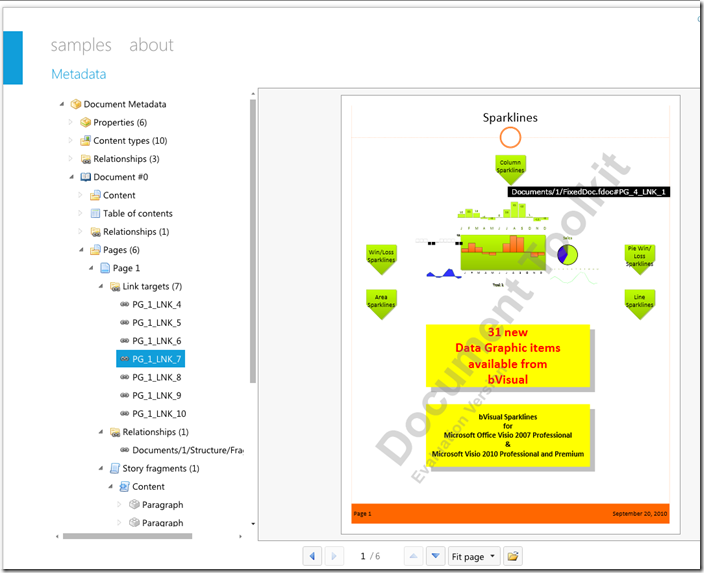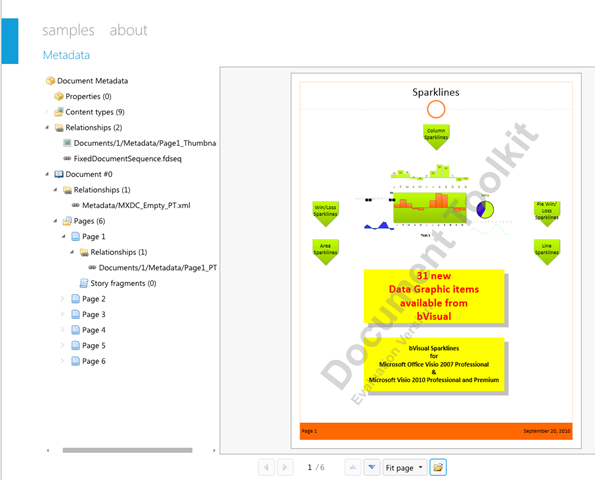You should all know by now that Microsoft Visio 2010 can save as Silverlight files … which is absolutely great … if you have Visio 2010. What if you do not have Visio 2010 but you want to view Visio documents in Silverlight? Well, you could save your document as a PDF or XPS file, and then view it in a viewer. A Silverlight viewer for XPS files would allow them to be seen on any browser or operating system that supports Silverlight, not just Windows. Although Microsoft have included an XPS viewer in Windows 7, and have made XPS viewers for earlier Windows versions, Microsoft do seem to have cooled-off promoting XPS as a replacement for PDF, which is a shame because XPS is an open, extensible format that is based on XAML.
Unfortunately, Microsoft do not provide a free Silverlight viewer for either of these formats, but there are several companies that do. I know that there is a CodePlex project for a Silverlight XPS Viewer ( http://azharthegreat.codeplex.com/ ), but it does not currently seem to like XPS documents from Visio. However, the company, First Floor Software, that provides the excellent Silverlight Spy has also written the Document Toolkit for Silverlight ( http://firstfloorsoftware.com/documenttoolkit ). This Silverlight control enables you to view an XPS document in several different ways, for example, with a page turn action, or by using thumbnails, or even to display the metadata inside the XPS file. The latter is extremely useful for checking the formation of the document.
Actually, there are two methods for creating XPS files from Visio …
The first method is to use the Microsoft add-in. In Microsoft Office Visio 2007, you have the option to download the free add-in from Microsoft (http://www.microsoft.com/downloads/en/details.aspx?FamilyID=4D951911-3E7E-4AE6-B059-A2E79ED87041&displaylang=en ). It is already built- into Microsoft Visio 2010. This will create an XPS file, complete with hyperlinks as necessary, as can be seen in the screenshot below when I loaded one of my Visio documents into the Document Toolkit online demo ( see http://firstfloorsoftware.com/documenttoolkit/online-demo/ ):
The second method is to print the document using the Microsoft XPS Document Writer. This has the advantage of being available in Microsoft Office System Visio 2003 as well as the later versions, however it does not export any hyperlinks.
Neither of these methods embed any Shape Data/Custom Properties into the XPS document, and neither does the Microsoft export to PDF. However, XPS is extensible, and it could be enhanced to include data, but then the viewer would need to be developed to surface the data.
Also, these XPS documents do not preserve any layering, which is a pity, but perhaps understandable, as Visio has a very complex layering system when compared to other vector diagramming applications.
I should say that Adobe Acrobat is capable of creating PDF documents from Visio that display both data and layers. I have never understood why Microsoft did not / have not done this for Visio too in XPS. I know that Microsoft only export to the public open PDF spec, but they could make the effort for XPS.


Hi David. I am a journalist for the above publication writing a series of articles on diagramming software in general and Visio in particular. Would you be happy to do a phone or email interview? I will naturally mention your book and your excellent blog.
Rgds
Ken